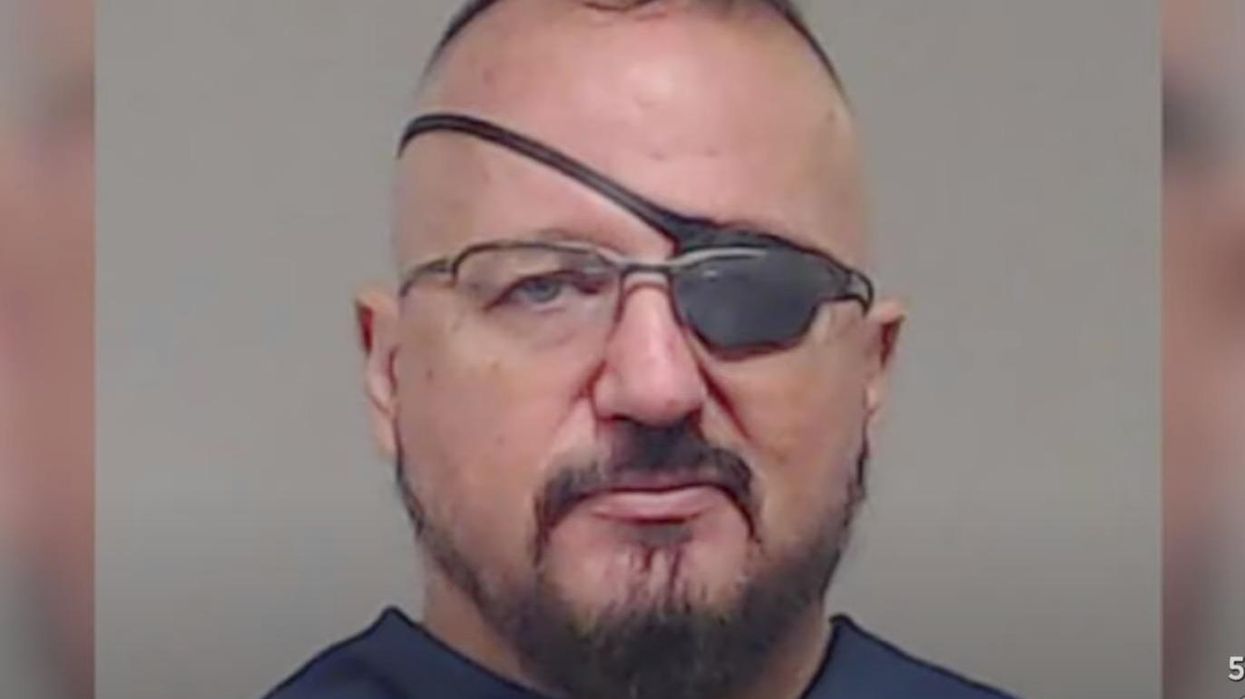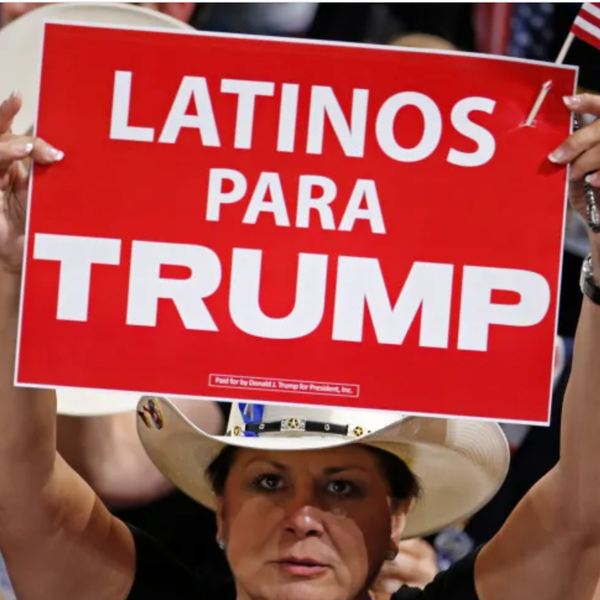Oath Keepers Seditious Conspiracy Trial Begins Next Month

Elmer Stewart Rhodes
The seditious conspiracy trial of former Oath Keeper ringleader Elmer “Stewart” Rhodes is still on track to begin this September.
U.S. District Judge Amit Mehta dismissed a request to delay the trial to January 2023 over concerns from Rhodes and his attorneys that this summer’s House Select Committee hearings made a fair trial an impossibility. Mehta locked in the September 26 trial date last week, reiterating that he would ensure the jury selection process was fair and that any further delay was unnecessary. Moving the trial was also impossible due to the many competing, unrelated schedule demands on an already busy docket in the nation’s capital.
“The court’s docket cannot be dictated by how Congress is acting and what they are doing … I have no influence over what they do and when they do it. What I do have control over is whether these defendants receive a fair trial through the most vigorous voir dire process that can happen,” Mehta said, according to The Washington Post.
Mehta, appointed by former President Barack Obama, emphasized that a potential release of transcripts from the January 6 committee in the weeks ahead did not warrant a trial delay either.
He agreed to reconsider the request if committee transcripts went public on the eve of Rhodes’ trial and if the records contained specific information about him or other Oath Keepers under indictment including Kelly Meggs, Kenneth Harrelson, Jessica Watkins, Roberto Minuta, Joseph Hackett, David Moerschel, Thomas Caldwell, and Edward Vallejo.
But according to Law and Crime, Mehta was firmly set on starting in September and told defense attorneys to disabuse themselves of the notion that coverage of January 6 in the press would irrevocably taint the trial’s outcome.
“Whether this trial is held in September, November or December or January, the news media is going to continue to cover the events of January 6, before the September hearings or after the September hearings. We’re not going to avoid that publicity by virtue of moving this trial for a few months,” he said.
Meanwhile, Rep. Bennie Thompson, the chairman of the select committee, told reporters last month the panel had begun negotiating with the Justice Department over access to records it collected during its investigation. In a statement to Politico days later, a committee spokesman confirmed that some 20 transcripts were soon to be shared with the Justice Department. No timeline on that specifically was given. A spokesman did not immediately return a request for comment Monday.
The select committee is expected to hold public hearings next month, though an exact schedule has not yet been confirmed. When members meet next they are likely to review findings that made it into the body’s interim report. It is also possible that committee investigators will disclose new information or other evidence churned up since their eight back-to-back hearings concluded this summer.
Getting this seditious conspiracy trial off the ground from a purely logistical standpoint has proven somewhat difficult given the large number of Oath Keepers facing conspiracy charges, the always-packed docket at the federal court in Washington, D.C., and most key, the battle over a huge amount of discovery both prosecutors and defense attorneys were required to sort through.
But after two delays this spring and multiple failed attempts to change venues put forward by the defendants, the Sept. 26 seditious conspiracy trial is on, and the first group of Oath Keepers to face jurors will be Rhodes, Meggs, Harrelson, Caldwell, and Watkins.
The next group will go to trial in February 2023. Those defendants include Oath Keepers Edward Vallejo, Roberto Minuta, Joseph Hackett, and David Moerschel.
Prosecutors charge that Rhodes and his codefendants engaged in an extensive, weaponized plot to stop the peaceful transfer of power and orchestrated a conspiracy to obstruct the counting of votes by Congress on Jan. 6 to that end.
Through stockpiling weapons, deploying “quick reaction force teams” situated just outside of D.C. in Virginia, and using an advanced communications network, prosecutors say members of the extremist group conspired to intimidate government officials, aided and abetted civil disorder, and tampered with documents in order to obstruct the transfer of power.
Court records filed ahead of trial by prosecutors have offered a glimpse into what they plan to argue this fall.
Instead of allowing defendants to heap the responsibility for their actions solely on the shoulders of former President Donald Trump, prosecutors instead want to highlight how the Oath Keepers’ individual and collective actions were planned and well thought out.
Further, they argued, Oath Keepers who stormed the Capitol, plotted for an insurrection, or otherwise aided a conspiracy to do so were not “taking orders” from the former president because any such order would have been illegal.
“Here any ‘public-authority’ defense put forth by the defendants would fail for two reasons: no government agent possessed actual authority to order the defendants’ criminal actions, and, in any event, it would have been objectively unreasonable torely on any such order,” prosecutors wrote on July 29.
Trump did not have authority to “permit or authorize a conspiracy to forcibly oppose the authority of the government or the execution of the laws of the United States, nor could he have lawfully sanctioned the attack on the United States Capitol on January 6 or any of theother criminal conduct allegedly perpetrated by defendants,” U.S. Attorney Matthew Graves argued.
This was the same conclusion reached by the D.C. court when it found former President Ronald Reagan could not order Oliver North to violate the law, “particularly if such ‘orders,’ explicit or implicit, represented nothing more than [the president’s desires.’”
“Any claim that defendants believed theyhad been authorized as an agent of the Executive Branch to oppose by force the authority of the United States, or forcibly stop the congressional certification of the vote by breaking into the Capitol would be objectively unreasonable,” Graves wrote.
The department also wants to shut down any theorizing that suggests law enforcement or police at the Capitol tried to aid those breaching the complex.
“The government acknowledges that the conduct of law enforcement officers may be relevant to the defendants’ state of mind on January 6, 2021. However, unless defendants were aware of law enforcement’s alleged inaction at the time of their entry onto restricted grounds or into the Capitol building (or at the time they committed the other offenses charged in the indictment), any alleged inaction would have no bearing on the defendants’ state of mind and therefore would not meet the threshold for relevance,” a July 29 motion stated.
As for what some defendants want presented at trial, some Oath Keepers have asked to omit evidence from jurors, like the “death list” found in defendant Caldwell’s home after his arrest last January.
His attorneys chalked the list up to being a “doodle pad.”
Though the names of those on the list were not revealed when he was first arrested, Caldwell exposed in court filings last month that they were those of Georgia election workers Shaye Moss and Ruby Freeman.
Moss and Freeman were forced to go into hiding as a result of the threats and harassment they experienced regularly when former President Donald Trump singled them out while spewing baseless conspiracy claims about voter fraud in the 2020 election.
Moss testified under oath at one of the Jan. 6 committee’s public hearings this June, choking back tears as she described how every part of her life has been turned “upside down.” At one point, she described a frantic call from her grandmother, who was terrorized as people knocked on her door and tried to barge in, claiming a citizens arrest needed to be made for Moss and her mother.
The scene was reminiscent of a modern-day lynching attempt.
“She was just screaming and didn’t know what to do. And I wasn’t there, so, you know, I just felt so helpless and so horrible for her. And she was just screaming. I told her to close the door and don’t open that door for anyone,” Moss testified.
Prosecutors said evidence found in Caldwell’s Virginia home indicated he “dehumanized those who held opposing world views and discussed killing them, shooting them and mutilating their corpses to use them as shields.”
Caldwell has vehemently denied this, telling CNN through his attorney that suggestions he wished to assassinate officials or election workers was “100% false.”
The 66-year-old Navy intelligence veteran also sought to keep other evidence away from jurors, including records the government alleges show he tried to have someone build him firearms before January 20. He has since argued in court that he was too weak to storm the Capitol on January 6 and has asked that his medication regimen be up for jurors’ consideration.
There has been a request too by co-defendant Jessica Watkins to keep allegations about “bomb making instructions” found in her home out of trial.
The Justice Department says it has evidence Oath Keepers toted grenades and other weapons with them in an RV when they came to Washington on January 6. Court records show this allegation came by way of a disclosure from Florida Oath Keeper Kelly Meggs to fellow Florida resident Caleb Berry. Prosecutors allege Meggs told Berry that Oath Keeper Jeremy Brown had the explosives in his vehicle that day.
A search warrant of Brown’s residence turned up two illegal short-barrel firearms, and when agents searched the RV he used to go to Washington, they found grenades. Prosectors admitted they were unsure if the grenades found in Brown’s RV were the same ones that were stashed with the “quick reaction force” teams that positioned themselves in northern Virginia ahead of the Capitol assault.
Berry pleaded guilty to two counts of conspiracy and a single count of obstruction and admitted to being part of the military stack formation that breached the Capitol on January 6. He admitted to coordinating plans with fellow Oath Keepers to bring weapons to Washington, and he entered the Capitol with body armor and tactical gear on around 2:40 PM.
Like Berry, Oath Keeper and Florida resident Graydon Young admitted to being in the stack. He has been cooperating with prosecutors as part of his plea agreement. Alabama Oath Keeper Mark Grods entered the Capitol after Young and others made it inside. Grods has pleaded guilty as well and has reportedly been sharing information with the federal government about the group’s encrypted chat network as well as plans for the weapons cache in Virginia.
Those who have pleaded guilty so far in the seditious conspiracy case include Joshua James, Brian Ulrich, and William Todd Wilson.
Wilson pleaded guilty in May to seditious conspiracy and obstruction of an official proceeding. His plea deal came as a surprise; he had not been previously named as a defendant in the Oath Keepers Jan. 6 cases.
Wilson allegedly joined Rhodes in the plot stop the transfer of power on Jan. 6 and worked with other regional leaders to take up Rhodes’ “call to arms,” prosecutors said. The 44-year-old North Carolina resident admitted that he was a member of the Oath Keepers since 2016 and that he linked up with Rhodes in a leadership chat group in November 2020.
With Rhodes’s instruction, Wilson drove from North Carolina to D.C. on Jan. 5, bringing an AR-15-style rifle, a 9 millimeter pistol, body armor, pepper spray, a pocketknife, and some 200 rounds of ammunition. Wilson told prosecutors he filmed his fellow Oath Keepers moving in the stack formation up the Capitol stairs, and that he entered closely behind Meggs and Berry.
Brian Ulrich of Georgia, who cried as he entered his guilty plea in court this April, admitted that he conspired for months with Rhodes to stop Congress from certifying the election on 2020. In the run-up to the attack, he planned on using two backpacks, one filled to the brim with ammunition, “if shit truly hits the fan blades.”
“I’ll be the guy running around with the budget AR,” he wrote in a December 31 Oath Keepers group chat.
Joshua James was the first Oath Keeper to plead guilty to seditious conspiracy and cop a deal with prosecutors. James admitted this March that he was part of the quick reaction force unit and further, that he was prepared to “report to the White House grounds to secure the perimeter and use lethal force if necessary against anyone who tried to remove President Trump from the White House, including the National Guard or other government actors who might be sent to remove President Trump as a result of the presidential election.”
James is the same Oath Keeper who chauffeured Trump ally and GOP operative Roger Stone around Washington in the run-up to January 6. When he was inside the Capitol, James admitted to brawling with police. Once he left, he met with Rhodes and other Oath Keepers. They changed clothes, he said, and worked fast to hide their identities. Then they met at Olive Garden to celebrate and plan what would come next. President Joe Biden’s inauguration was days away.
According to his indictment, in the hours after the insurrection, Rhodes was buzzing about what was to come.
“Thousands of ticked off patriots spontaneously marched on the Capitol,” he wrote. “You ain't seen nothing yet.”
Rhodes is currently being held in a detention facility in Alexandria, Virginia.
Members of the Proud Boys facing seditious conspiracy will go to trial in December after a federal judge in June agreed to delay proceedings.
The trial for the former chairman of the Proud Boys, Henry “Enrique” Tarrio, was supposed to begin Monday, August 8, but U.S. District Judge Tim Kelly said weeks ago that he shared concerns from prosecutors and defense attorneys alike about new evidence that could soon emerge from the select committee. The new trial date is December 12.
“The parties’ inability to prepare their respective cases to account for such additional information is potentially prejudicial to all parties,” assistant U.S. Attorney Erik Kenerson wrote.
Reprinted with permission from Daily Kos.
- Oath Keepers leader and 10 others charged with 'seditious conspiracy' ›
- Oath Keeper emotional as he accepts 2nd plea deal in Jan. 6 ... ›
- Oath Keeper is 1st to plead guilty to seditious conspiracy for Jan. 6 ... ›
- Oath Keepers seditious conspiracy trial moved to Sept. - The ... ›
- Leader of Oath Keepers and 10 Other Individuals Indicted in Federal ... ›
- Oath Keepers seditious conspiracy trial on track for Sept. 26 as ... ›
- Judge rejects bid to delay Oath Keepers Jan. 6 trial - POLITICO ›








